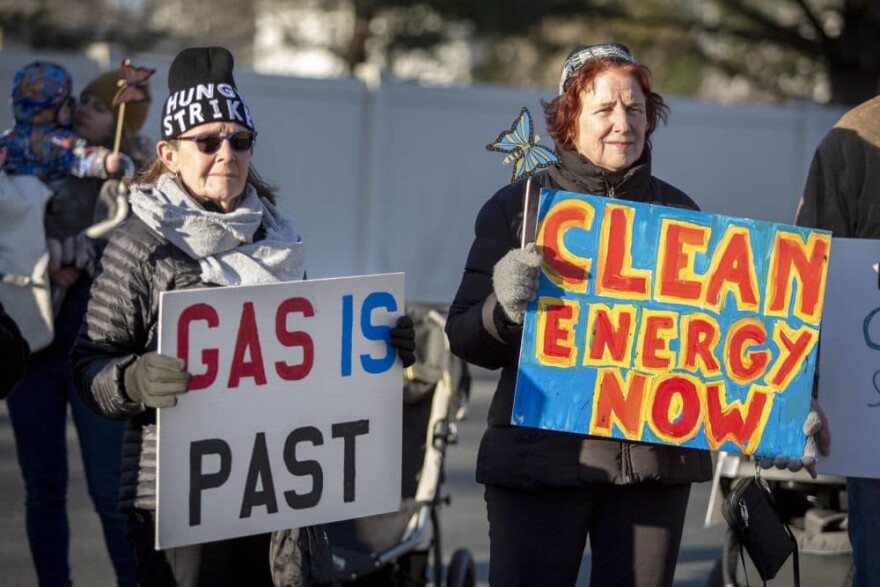ISO New England works every day to make sure the region’s electric grid is stable and the lights stay on. As the nonprofit grid operator, this is the organization’s primary job.
But as many states in the region strive to slash carbon emissions by “electrifying everything” — from our heating and cooling systems to our vehicles — and shifting the region’s power supply from natural gas to renewables, some environmental advocates say it’s time for the grid operator to shift its priorities too. They say they want to see ISO New England include more community voices and perspectives in its planning.
To that end, Massachusetts and four other New England states on Tuesday to create a first-in-the-nation executive-level position dedicated to environmental justice and energy equity. The goal, they say, is to ensure that the organization is focusing as much on the people who use electricity as it is on the infrastructure and markets that make the grid function.
“A successful clean energy transition cannot happen without community engagement and a meaningful role for [environmental justice] communities in helping to shape decisions that ... affect how the benefits and burdens of our electric system are apportioned,” the letter says. “Creating this position would serve as a critical bridge from ISO-NE to the communities it serves.”
It’s a “bridge” some environmental advocates say has been sorely missing.
Historically, “cost and reliability have been the two sole considerations in [ISO New England’s] decision making,” said Mireille Bejjani with , a regional grassroots movement that aims to accelerate an equitable and democratic energy transition.
But, she added, the public health, financial and environmental impacts of electricity generation and distribution matter too: “We're not going to be successful in our energy transition if we're not taking into account the human side of the grid.”

New England is at an important juncture in its energy transition. The region is working to overhaul the types of power that feed into the grid and plan for a future where electricity is generated and stored in less centralized ways.
In Massachusetts, for example, about 20% of the state’s overall carbon emissions currently come from — primarily from burning natural gas in large power plants. To stay on track with its , the state needs to shutter existing fossil fuel plants and add a lot more and battery storage to the grid.
The four other New England states who signed the letter — , , and — have clean energy and climate goals that are equally ambitious.
Getting homes, vehicles and the economy to run on clean electricity will also require building a lot of electrical infrastructure throughout the region — transmission lines, substations, solar farms.
With all of this planning and change happening, now is the time to ensure “we're not repeating the harms [of the past and] piling onto overburdened communities,” Bejjani said.
In New England — and throughout much of the country — polluting infrastructure has historically been sited in lower-income neighborhoods and communities of color. Breaking that pattern and rectifying past harms is unlikely to happen without deliberate planning and work, advocates say.
Though ISO New England and its regulator, the Federal Energy Regulatory Commission, have committed to including community voices, many say the work is not happening fast enough. Case in point: to discuss how New England's grid may fare if a large liquified gas terminal in Everett shuts down.
Though there were hundreds of energy experts and government officials in the meeting, no community members from Everett — a state-designated environmental justice community — were invited to participate.
“Everett is an example of an environmental justice community that it has been hosting ... polluting infrastructure and industry for decades,” Bejjani said. “And so to have that conversation without anyone from that community in the room is an example of exactly what we need to be avoiding in this energy transition, because then we're not taking into account the people who are most directly impacted by the outcome.”

State officials from Massachusetts decline to comment on , but many who signed it — including the state’s first Undersecretary of Environmental Justice and Equity, — have been outspoken about the need to meaningfully incorporate community feedback into energy decision-making.
And according to the letter sent to ISO New England, a new executive-level position dedicated to environmental justice could be an important first step.
If the position is created, some of the key responsibilities of the person who holds it would include:
- Advising ISO leadership about how to integrate environmental justice principles into its everyday operations.
- Serving as a liaison to low-income, minority and overburdened communities (so-called “environmental justice communities”) to make sure their voices are heard and that information — especially technical information — from the grid operator is accessible.
- Coordinating with states and other regional partners to make sure environmental justice principles are incorporated at all levels of energy planning.
- Developing systems and metrics to track progress.
This is a tall order, and the signatories say they envision having a whole team dedicated to environmental justice down the line.
A spokesperson for ISO New England confirmed the receipt of the letter and said "[we] look forward to continuing our conversations with the New England states and stakeholders on issues related to environmental justice and the clean energy transition."
“It's really exciting to see the states take this step,” Bejjani said. “We can't successfully overhaul our electric system for the future that we need without taking into account environmental justice and without having that expertise in the room.”
This story was . It was shared as part of the New England News Collaborative.




